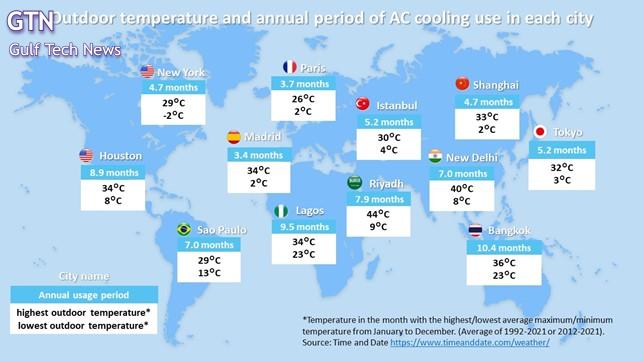Daikin Launches Air Quality Global Survey

Daikin, an HVAC-R manufacturer present in 175 countries and regions, celebrating its 100th anniversary this year, conducted the Daikin World Air Survey, involving 1,200 participants from 12 cities worldwide, including Riyadh, Houston, Tokyo, Lagos, Madrid, and more.
This comprehensive survey aimed to explore attitudes and usage patterns of air conditioning in homes. As Riyadh endures some of the world’s highest temperatures, this survey offers insights into how residents are coping with the soaring temperatures while managing the heavy reliance it brings on air conditioning.
The findings reveal substantial daily air conditioning use and significant temperature fluctuations, underlining the city’s unique cooling challenges.

The key findings for Riyadh:
Significant temperature difference: When studying the difference between the average maximum outdoor temperature*2 and the average set temperature*1 for AC during the hottest month in each city, the largest difference was found in Riyadh at 20.6°C (average maximum outdoor temperature: 44.0°C, average set temperature for AC: 23.4°C) while on the other hand Lagos was also found to have the third largest temperature difference, with a 12.1°C variation (average maximum outdoor temperature 34.0°C and an average AC setting of 21.9°C).
High daily AC usage: During the survey when asked about the average time spent using AC at home all day during the hottest month of the year*3, Riyadh was found to use air conditioning for 14.9 hours, the second longest time after Houston.
On the other hand, Madrid had the shortest usage time with 5.6 hours whereas Paris and Istanbul had the second and third shortest with 6.3 hours and 6.8 hours respectively.
Extreme outdoor temperatures: The study reveals that Riyadh endures the highest average temperatures, reaching 44°C, compared to Bangkok’s 36°C. Despite experiencing the most extreme heat among the cities surveyed, Riyadh’s air conditioning usage is notably shorter, spanning 7.9 months annually.
In contrast, Bangkok, while having a lower peak temperature to Riyadh, necessitates air conditioning for a longer period, extending to 10.4 months of the year.
Preference for airflow exposure: According to the study, Riyadh recorded an average result of 76% of its residents who like being exposed to and feeling the airflow of air conditioners, compared to 52% in Madrid being the lowest while 98% in Bangkok being the highest.
This preference indicates, residents in Riyadh are 24% more likely to prefer feeling the airflow from air conditioners compared to residents in Madrid, and residents in Bangkok are 22% more likely to prefer feeling the airflow from air conditioners compared to residents in Riyadh.
Points to be considered during AC purchase: Energy efficiency is the primary choice criterion when purchasing an AC in 11 out of 12 cities. A relatively high proportion of respondents in New York, Istanbul, Paris and Madrid cited a ‘desire to reduce environmental impact’ as a key reason for prioritizing ‘energy efficiency’.
While energy efficiency was a top choice for 33% of Riyadh residents, affordability at 17% and efficient cooling/heating performance and durability at 16% were significant factors considered while purchasing AC.
Whereas, Istanbul exhibited the highest emphasis on energy efficiency at 35% amongst other surveyed cities, followed by equal importance placed on affordability and performance at 16%.
*1 Average of the temperature most commonly set for residential AC cooling during the hottest month of the year. Responses of ‘18°C or lower’ were calculated as 18°C, while ‘30°C or higher’ were calculated as 30°C. Responses stating ‘automatic’ settings were excluded from the calculations.
*2 Temperature in the month with the highest average maximum temperature from January to December. (Average of 1992-2021 or 2012-2021). Source: Time and Date https://www.timeanddate.com/weather/
*3 Average hours of AC cooling use per day when spending all day at home during the hottest month of the year. Calculated as 1.5 hours for responses of ‘1-2 hours’, 3.5 hours for ‘3-4 hours’, 5.5 hours for ‘5-6 hours’, 8.5 hours for ‘7-10 hours’, 13 hours for ‘11-15 hours’, 19.5 hours for ‘16-under 24 hours’ and 24 hours for ‘24 hours’.
These insights not only highlight Riyadh’s unique cooling challenges but also demonstrate Daikin’s commitment to providing efficient and reliable air conditioning solutions tailored to extreme climates.
The survey’s findings emphasize the need for advanced HVAC-R technologies in Riyadh, ensuring residents can maintain comfort despite the harsh weather conditions.
The survey was designed to enhance global awareness of air conditioning and air quality by identifying and comparing attitudes and usage across various cities around the globe.




